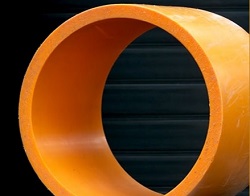- Home page /
- News /
- Company news /
- The use of plastic pipes in gas pipelines
The use of plastic pipes in gas pipelines
 |
| Courtesy of cbn.co.za |
South Africa’s gas industry is on the cusp of great growth and expansion in light of a potential global oversupply of shale gas. Locally, the Department of Energy has confirmed the potential development of regional gas-fields, which will lead to natural gas becoming a more important fuel in South Africa.
With the availability of natural gas in neighbouring countries, such as Mozambique and Namibia, and the discovery of offshore gas reserves in South Africa, the gas industry in South Africa is set to undergo rapid expansion.
“In view of these developments, local plastic pipe manufacturers have to ensure that the pipes used in gas pipelines, have been manufactured according to stringent specifications and adhere to global standards,” says Jan Venter, Chief Executive Officer of the Southern African Plastic Pipe Manufacturers Association (SAPPMA.) This non-profit association represents more than 80% of the plastic pipe produced in South Africa and focuses its efforts on ensuring pipe systems that are correctly designed, leak-free and durable for long- term use, including the rehabilitation of old pipelines.
Natural gas is a clean-burning, more affordable and more secure source of fuel and is increasingly being looked at as an alternative source of energy for both domestic and industrial use. It burns cleaner than any other fossil fuel, emitting up to 70% less carbon dioxide (CO2) than coal in electricity generation. A modern gas-fired power plant is also 40% more efficient than a coal-fired. Developing South Africa’s gas pipelines is expected to unlock significant socioeconomic and environmental benefits for the country.
According to Venter, pipes made from High Density Polyethylene (HDPE) are widely used for the distribution of natural gas as they have a well-documented inertness to both the external soil environment and to natural gas.
“Extensive testing has taken place over the last 45 years, confirming time and again that the long-term strength of plastic pipes are unaffected by natural gas and its common constituents – making them the ideal material to use in gas pipelines,” Venter said.
Venter has first-hand knowledge of the potential challenges of a pipeline and why it is crucial to ensure that the materials used are up to the task, as he was involved in installing the first gas pipeline in Mozambique using HDPE pipe. An 865km cross-border, natural gas pipeline was later installed from the Temane gas fields in Mozambique to Sasol's synfuels plant at Secunda in the early 2000, also using HDPE pipe.
Source: cbn.co.za

